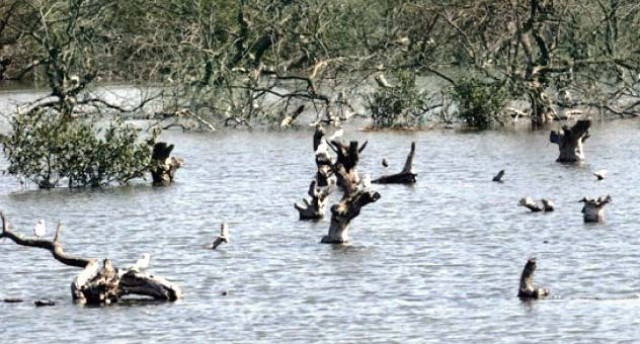Survival of 4m fishermen hangs in balance as fishing sites rapidly deteriorate
The coastline is over 350 kilometres long and stretches over three districts.

“Environment? You mean the season? Yes, it has changed abruptly in the last couple of years...” surmised Yousuf, also known as Joso. He was lost in deep thought as he looked over at the mangroves from the beach.
Joso wondered what would happen to him and other fishermen of Rehri Goth and Ibrahim Hyderi if the environmental conditions in the area continue to deteriorate at the present rate.
Dumping of industrial effluent and sewage water has seriously affected the small fishing business along the 350-kilometre coastline which stretches along three districts, Karachi, Thatta and Badin.
According to Pakistan Fisherfolk Forum (PFF), around four million fishermen depend upon this lifeline for their survival.
Majeed Motani of the PFF said that the fishermen used to fish with small nets. But now they couldn’t do so because of the pollution. But for the fishing community living at the coast for centuries, people living in areas which are near Karachi – Rehri Goth and Ibrahim Hyderi, have other problems to add to their plate as well. Their proximity to the commercial hub means that people from other areas are constantly coming to settle here. This means less fish to catch for every one.
Around 30 years ago, Rehri Goth used to be a village rich in cultural activities. But now, new settlements have sprung up at a fast pace, mostly of Pashto and Bengali-speaking people. The fishermen who have been living here for decades now don’t have enough fish to catch – which is a big problem because a lot have died already because of pollution.
Motani believed that the fishing culture needed to be preserved first. “What if all the fishermen move or leave the profession?” he asked. “We have to preserve the culture first and ensure that this marginalised and neglected community survives and stands on their feet.” The fishermen in Rehri Goth used to live in thatched huts. The government built dozens of modern houses for them which the people are not particularly fond of. The houses consist of a single-room, with a toilet and a kitchen.
“The kitchen is congested and we don’t like to cook in it,” said a mother of four, Sherbano. Her husband makes fishing nets for Pughto-speaking contractor and was paralysed three years ago.
Meanwhile, the people of Rehri Goth seem to have accepted their fate. “It is our destiny now,” said Raheema, a mother of eight children. Worry was etched in her already-creased face as she told The Express Tribune that skin diseases were spreading fast among the children of her village because the water being supplied was contaminated.
She also said that the taste of the fish had changed because of the chemicals present in the industrial effluent. “Can you kiss a child with acne on his or her face?” she asked. “Then how will you be able to like the fish which have a disease?”
Published in The Express Tribune, June 30th, 2012.



















COMMENTS
Comments are moderated and generally will be posted if they are on-topic and not abusive.
For more information, please see our Comments FAQ